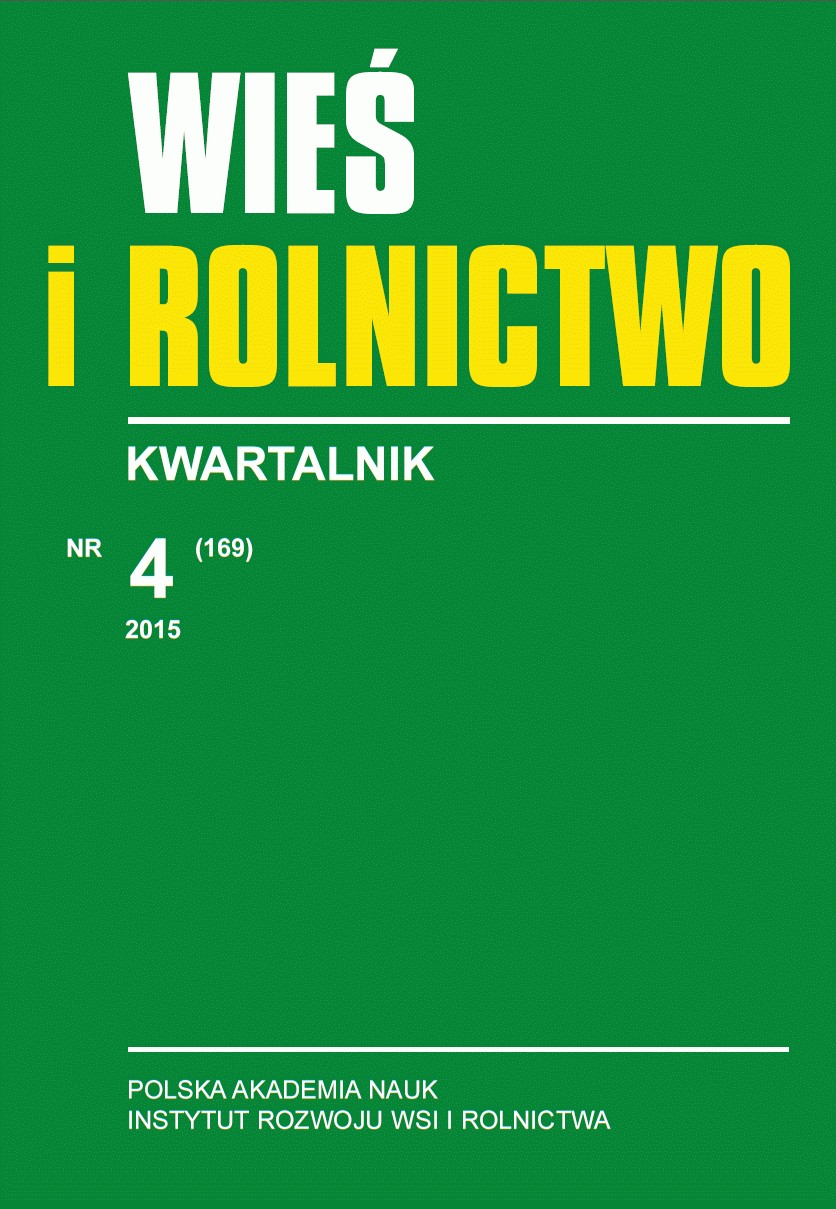The decrease in the importance of land rent in the long run and its consequences
DOI:
https://doi.org/10.53098/wir.2015.4.169/02Keywords:
agriculture, land rent, capitalAbstract
The article develops the thesis of Thomas Piketty by distinguishing land from the general aggregate of capital resources, and then by comparing the growth rate of the land rent with the rate of growth of the incomes of the other production factors. The study of long-term trends in Italy, Spain, Great Britain, Germany, France, Denmark and Poland identified common to the most of these countries process of land rent regression, which carries a number of negative consequences, such as land-grabbing, unsustainability of the production processes in agriculture, and the relative deterioration of the situation of farmers. The occurrence of these phenomena associated with the regression of ground rent, caused by market mechanism, justifies the need for adjustment instruments in the form of the agricultural policy tools.References
Alston J.M., James J.S., 2002: The Incidence of Agricultural Policy. [w:] Handbook of Agricultural Economics, B.L. Gardner, G.C. Rausser (red.), vol. 2B. Elsevier, Amsterdam.
Baer-Nawrocka A., 2011: Ewolucja Wspólnej Polityki Rolnej a kwestia parytetu dochodów rolniczych. Prace Naukowe Uniwersytetu Ekonomicznego we Wrocławiu, nr 166.
Begg D., Fischer S., Dornbusch R., 1993: Ekonomia, T. 1. PWE, Warszawa.
Borras S., Franco J., 2011: Political Dynamics of Land-grabbing in Southest Asia: Understanding Europe’s Role, K. Cumming (red.). Transnational Institute (TNI), Amsterdam.
Brooke G.T.F., 2010: Uncertainty, Profit and Entrepreneurial Action. Journal of the History of Economic Thought, vol. 32. DOI: https://doi.org/10.1017/S1053837210000179
Ciaian P., Swinnen J.F.M., 2009: Credit Market Imperfections and the Distribution of Policy Rents. American Journal of Agricultural Economics, nr 91 (4). DOI: https://doi.org/10.1111/j.1467-8276.2009.01311.x
Coscieme L., Pulselli F.M., Niccolucci V., Patrizi N. & Sutton P.C., 2015: Accounting for “land-grabbing” from a biocapacity viewpoint. Science of The Total Environment, nr 539. DOI: https://doi.org/10.1016/j.scitotenv.2015.09.021
Czyżewski A., Henisz-Matuszczak A., 2005: Makroekonomiczne uwarunkowania rolnictwa industrialnego i społecznie zrównoważonego. Refleksje na temat sprzężeń regulacyjnych i realnych. [w:] Koncepcja badań nad rolnictwem społecznie zrównoważonym, J.S. Zegar (red.). IERiGŻ, Warszawa.
Czyżewski A., 2015: Teoriopoznawcze przesłanki rozwoju rolnictwa rodzinnego. [w:] Ekonomiczne mechanizmy wspierania i ochrony rolnictwa rodzinnego w Polsce i innych państwach Unii Europejskiej, A. Chlebicka (red.). FAPA, Warszawa.
Czyżewski B., 2013: Renty ekonomiczne w gospodarce żywnościowej w Polsce. PWE, Warszawa.
De Gorter H., Swinnen J.F.M., 2002: Political economy of agricultural policies. [w:] The Handbook of Agricultural Economics, B.L. Gardner, G.C. Rausser (red.), vol. 2. Elsevier, Amsterdam. DOI: https://doi.org/10.1016/S1574-0072(02)10023-5
Franco J.C., 2012: Global land grabbing and trajectories of agrarian change: a preliminary analysis. Journal of Agrarian Change, nr 12 (1). DOI: https://doi.org/10.1111/j.1471-0366.2011.00339.x
Grajales J., 2015: Land grabbing, legal contention and institutional change in Colombia. Journal of Peasant Studies, http://www.tandfonline.com/doi/full/10.1080/03066150.2014. 992883 [dostęp: 12.11.15].
Jiao X., Smith-Hall C., Theilade I., 2015: Rural household incomes and land grabbing in Cambodia. Land Use Policy, nr 48. DOI: https://doi.org/10.1016/j.landusepol.2015.06.008
Kamerschen D., Mckenzie R.B., Nardinelli C., 1992: Ekonomia, PWN, Gdańsk.
Kleijn D. i in., 2009: On the relationship between farmland biodiversity and land-use intensity in Europe. Proceedings of the royal society B: biological sciences, nr 276.1658. DOI: https://doi.org/10.1098/rspb.2008.1509
McCorriston S., Sheldon I.M., 1991: Government Intervention in Imperfectly Competitive Agricultural Input Markets. American Journal of Agricultural Economics, nr 73. DOI: https://doi.org/10.2307/1242815
OECD, 2000: A Matrix Approach to Evaluating Policy: Preliminary Findings from PEMPilot Studies of Crop Policy In the EU, the US, Canada and Mexico. OECD Directorate for Food, Agriculture and Fisheries Trade Directorate, Paryż.
Pareto V., 1896: Cours d’Economie Politique, Vol. 2. F. Rouge, Lozanna.
Piketty T., 2015: Kapitał w XXI wieku. Aneks techniczny. http://piketty.pse.ens.fr/fr/capital21c [dostęp: 12.12.15].
Piketty T., 2015: Kapitał w XXI wieku. Wydawnictwo Krytyki Politycznej, Warszawa.
Robinson J., 1984: Economics of Imperfect Competition. Macmillan, London.
Salhofer K., Schmid E., 2004: Distributive Leakages of Agricultural Support: Some Empirical Evidence. Agricultural Economics, nr 30. DOI: https://doi.org/10.1111/j.1574-0862.2004.tb00175.x
Samuelson P.A., 1951: Economics. McGraw-Hill, New York.
Sulieman, H.M., 2015: Grabbing of communal rangelands in Sudan: The case of large-scale mechanized rain-fed agriculture. Land Use Policy nr 47. DOI: https://doi.org/10.1016/j.landusepol.2015.04.026
Swinnen J.F.M., 2010: The political economy of agricultural distortions: The literature to date. [w:] The Political Economy of Distortions to Agriculture, K. Anderson (red.). Cambridge University Press, Cambridge i Nowy Jork. DOI: https://doi.org/10.1596/28172
Tilman D., Cassman K.G., Matson P.A. i in., 2002: Agricultural sustainability and intensive production practices. Nature, nr 418 (6898). DOI: https://doi.org/10.1038/nature01014
Von Braun J., & Meinzen-Dick R.S., 2009: “Land grabbing” by foreign investors in developing countries: risks and opportunities. International Food Policy Research Institute Waszyngton.
Wójcicki Z., 2006: Poszanowanie energii i środowiska w rolnictwie i na obszarach wiejskich. Infrastruktura i Ekologia Terenów Wiejskich, nr 2/1.
Zegar J.S., 2009: Kwestia koncentracji ziemi w polskim rolnictwie indywidualnym. Roczniki Nauk Rolniczych. Seria G, 96 (4). DOI: https://doi.org/10.22630/RNR.2009.96.4.88
Zegar J.S., 2013: Rola drobnych gospodarstw rolnych w procesie społecznie zrównoważonego rozwoju obszarów wiejskich. Problemy Drobnych Gospodarstw Rolnych, nr 1.
Zegar J.S., 2005: Koncepcja badań nad rolnictwem społecznie zrównoważonym. [w:] Koncepcja badań nad rolnictwem społecznie zrównoważonym, J.S. Zegar (red.). IERiGŻ, Warszawa.
Downloads
Article file downloads
Pages
How to Cite
Issue
Section
License
Copyright (c) 2015 Wieś i Rolnictwo

This work is licensed under a Creative Commons Attribution 4.0 International License.










